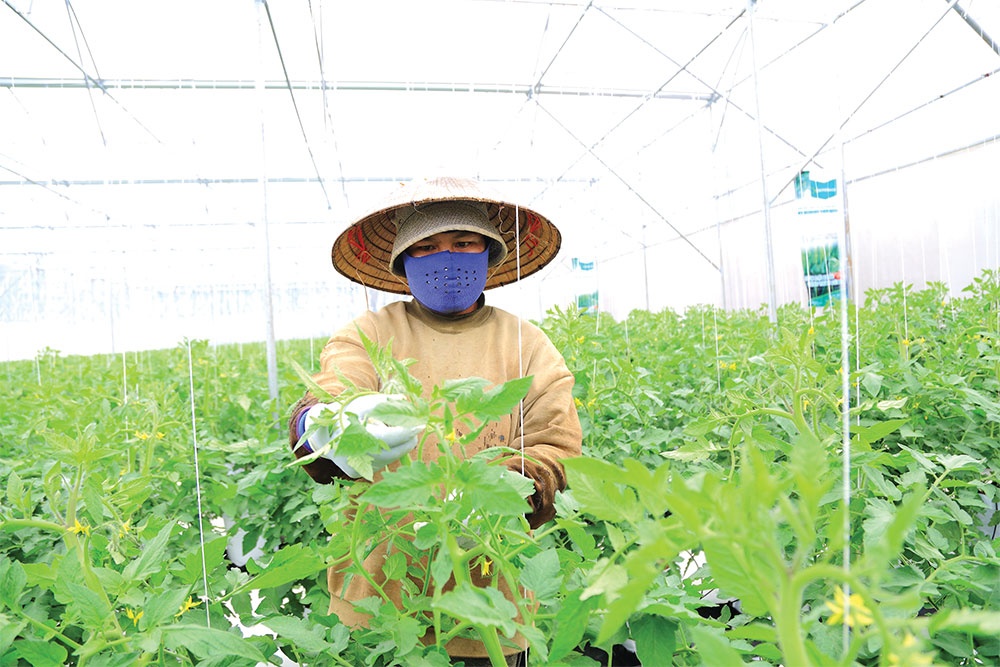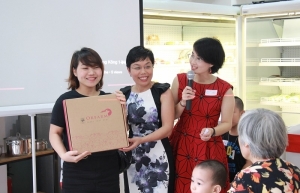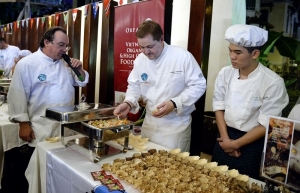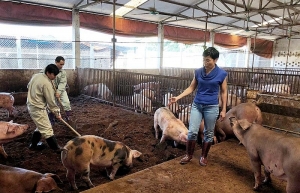Market decline hits organic agriculture
After 10 years, Vietnamese organic food brand ORFARM has been forced to stop operating its chain of all-organic food showrooms in Hanoi and Ho Chi Minh City. CEO Bui Bich Lien said, “This is a sad ending. We tried, but we still had to give up due to post-pandemic difficulties and the decline of the market in general. However, we are trying to keep our farm going to supply frozen meat and fresh vegetables for our distribution partners.”
 |
| Companies and farmers have been squeezed since the tight global restrictions of 2021, Le Toan |
ORFARM owned eight large showrooms in expensive locations in Hanoi and Ho Chi Minh City at its peak during 2016-2019. At that time, the daily turnover at a store could reach about VND100 million ($4,350). But when it was forced to close the last showroom, sales were not even enough to cover rental costs and staff salaries.
Organic agriculture used to be a vibrant and potential market for businesses. From the initial stage in 2012 with the opening of the first organic food store, Organica, many other brands were born such as Organic Food, Cau Dat Farm, Dalat GAP Store, and V-Organic. In addition to a speciality store, organic food products from vegetables, fruit, and rice to spices, coffee, meat, and eggs are also widely available at most food stores and supermarket chains.
Before the pandemic, 86 per cent of Vietnamese consumers were willing to pay more for organic products for their daily meals, according to AC Nielsen’s 2019 organic food consumption trends report.
Although there is no official research data on the demand for organic food since, inflation is pushing up prices higher, making it more difficult for consumers to access organic products.
Minh Ngoc, a housewife in Cau Giay district of Hanoi, said that in the past, she always prioritised using 100 per cent organic food for family meals, but more than a year ago, this habit was impossible to maintain.
“I was forced to cut costs for organic food because my income was lower than before. Currently, my family still gives priority to buying organic vegetables and fruits. For other products, we switch to prestigious brands in the market,” Ngoc shared.
According to Vu Kim Hanh, chairman of the Business Association of High-Quality Vietnamese Goods, consumer confidence was seriously affected when some unqualified products were still labelled VietGap for sale in some supermarkets a month ago, affecting the consumption of agricultural products, including organic food items.
“While the standards of labelling, origins, and even product quality do not correspond to the value, the price of organic products can be six times higher than that of regular food,” Hanh said.
She also added that not only Vietnamese consumers but also importers are quite cautious and do not really believe in the quality of Vietnam’s organic agricultural products. When exporting to the European market, Vietnamese organic agricultural products are always required to be tested for pesticide residues, making it more expensive for Vietnamese businesses to take pesticide residue testing.
Data from the Ministry of Agriculture and Rural Development shows that Vietnam is home to nearly 100 organic production enterprises, of which 60 are involved in exporting with a combined turnover of $335 million per year. Vietnam’s organic products are present in 180 countries around the world and European countries are considered the main export and consumption markets.
Currently, producers still assess the organic food consumption market as unstable. Organic products experience a long farming and production process with stricter requirements and are more expensive than normal products, the consumption is a big challenge because of the high price.
In addition, it is difficult for businesses producing organic products to access capital to expand their business, because investment funds consider this field to be a risky investment.
According to Tran Phong Lan, director of Hai Au Agriculture Development JSC, organic agriculture can bring value to the community, but it is not easy to make quick profits. Without good capital or another business to compensate, it is difficult for businesses to pursue it in the long run.
“From 2013-2020, Hai Au had to spend $1.7 million and another $1.3 million for branding, launching products to the market, and building a distribution system. The development path of organic agriculture is not easy. It is very hard to create products, but the problem of product consumption is even more challenging,” Lan added.
 | Organic foods, healthy baby, happy mother On the occasion of Children Day 2019, ORFARM organised the nutritional day ORFARM Kids with the theme “Reviving the cell with organic foods,” with meaningful activities and valuable gifts for kids and parents. |
 | Orfarm spearheads organic thinking for Vietnam’s agriculture Although the prices of organic products are higher than refined or processed equivalents, this is offset by their precious value to human health and the environment, and grown in accordance with the forward-thinking environmental model of co-existence and sustainability, according to one top Vietnamese group in the field. |
 | Orfarm opens agri-tourism Two seemingly unrelated economic fields, agriculture and tourism, have partnered harmoniously to generate unique products, attracting domestic and particularly foreign visitors and opening a new way for Vietnam’s agricultural sector to add more value to its products. |
What the stars mean:
★ Poor ★ ★ Promising ★★★ Good ★★★★ Very good ★★★★★ Exceptional
Related Contents
Latest News
More News
- Vietnam sets ambitious dairy growth targets (February 24, 2026 | 18:00)
- Masan Consumer names new deputy CEO to drive foods and beverages growth (February 23, 2026 | 20:52)
- Myriad risks ahead, but ones Vietnam can confront (February 20, 2026 | 15:02)
- Vietnam making the leap into AI and semiconductors (February 20, 2026 | 09:37)
- Funding must be activated for semiconductor success (February 20, 2026 | 09:20)
- Resilience as new benchmark for smarter infrastructure (February 19, 2026 | 20:35)
- A golden time to shine within ASEAN (February 19, 2026 | 20:22)
- Vietnam’s pivotal year for advancing sustainability (February 19, 2026 | 08:44)
- Strengthening the core role of industry and trade (February 19, 2026 | 08:35)
- Future orientations for healthcare improvements (February 19, 2026 | 08:29)

 Tag:
Tag:



















 Mobile Version
Mobile Version